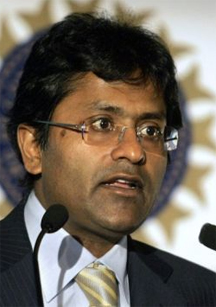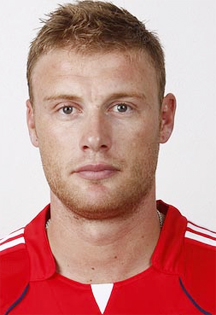(Cricinfo) Lalit Modi, the former Indian Premier League (IPL) commissioner, has said he was arm-twisted into rigging the 2009 player auction to ensure Andrew Flintoff was sold to the Chennai Super Kings. N Srinivasan, the BCCI president and the managing director of Indian Cements, the company that owns the Super Kings, dismissed Modi’s allegations as lacking in “substance or truth”.
Modi, who was sacked as the league’s commissioner on charges of financial irregularities and is currently based in London, also claimed that the exclusion of Pakistan players from the 2009 IPL season was because of “arm-twisting” by BCCI officials.
“I shouldn’t have let that [the rigging of Flintoff’s sale] happen”, Modi said during an interview to CNN-IBN, an Indian news channel. He also said the IPL was no longer the level playing field on which it was built, and that rules were changed to suit the bigger franchises. He conceded there was a lack of transparency and said the tournament had moved far enough from its basic principles to affect its long-term viability.
Srinivasan, who was BCCI secretary at the time of the 2009 auction, denied the allegations. “All I can say is that there is absolutely no substance or truth in what he [Modi] is saying,” he said. “If he is talking about 2009 why is he saying all this in 2012.”

The most damaging of Modi’s statements concerned Flintoff’s auction. Asked whether it had been rigged, he said: “Yes that is a fact. I made it clear that time. That onus was on me and as chairman I should have not allowed that to happen then. I was arm-twisted to allow Andrew Flintoff to go to Chennai Super Kings. I’m to blame for that. It’s a fact.”
Chennai bought Flintoff for $1.55 million at the auction in Goa, making him the most expensive player at the time alongside Kevin Pietersen. In buying JP Duminy for $950,000, Mumbai Indians had effectively ruled themselves out from the bidding for Flintoff, and Royal Challengers Bangalore did not enter the bidding for him at all. Rajasthan Royals tried to keep pace, but after buying Shaun Tait they had only $1.5 million left in their purse. The Deccan Chargers showed no interest in Flintoff, and Chennai eventually got him. Flintoff, however, played only three matches in the 2009 season before returning home injured. Knee surgery then ruled him out of the 2010 tournament.
In the interview, Modi also commented on the absence of Pakistan players from the 2009 tournament. They played the first season in 2008 but the Mumbai terror attacks in November that year put their future participation in doubt. Some Pakistan cricketers were part of the 2009 auction but they did not attract a single bid from any of the eight franchises. Modi said “arm-twisting” by the BCCI “that nobody should pick them” had led to the shut out of Pakistan cricketers.

The BCCI has been under scrutiny and criticism following the decision by Sahara, the sponsors of the Indian team and owners of the Pune Warriors IPL franchise, to pull out of its association with Indian cricket. Pune Warriors did not take part in the IPL’s supplementary auction held in Bangalore on February 4. Modi said that in the light of the Sahara dispute, he would not have allowed the auction to take place. “I would have not allowed the rules to be changed at first place. There would have not been a problem with Mr Subrata Roy or anybody had the rules been consistent.”
The pullout he said was “a big blow” for the BCCI, which was struggling to retain its sponsors. “We cancelled the contract with Nimbus without encashing their bank guarantee. With Kochi, Sahara, Nimbus and Sony contracts going down, it’s close to Rs 10,000 crores [approximately $2 billion] loss to BCCI.”
Modi also criticised the IPL’s decision to allow the franchises to retain up to four players after the contracts expired at the end of the 2010 season. Chennai and Mumbai Indians were the only teams to retain four players.
“The retention clause was only for first three years. All players were supposed to go back to auction after first three years,” Modi said. “In the fourth year [2011] that did not happen and they allowed the players to stay back. That became a problem… [it] was at the detriment of the new teams. When the new teams come in, that’s a problem for them and I had pointed it out last year. If you pull out few things the entire model is going to fall apart.”
